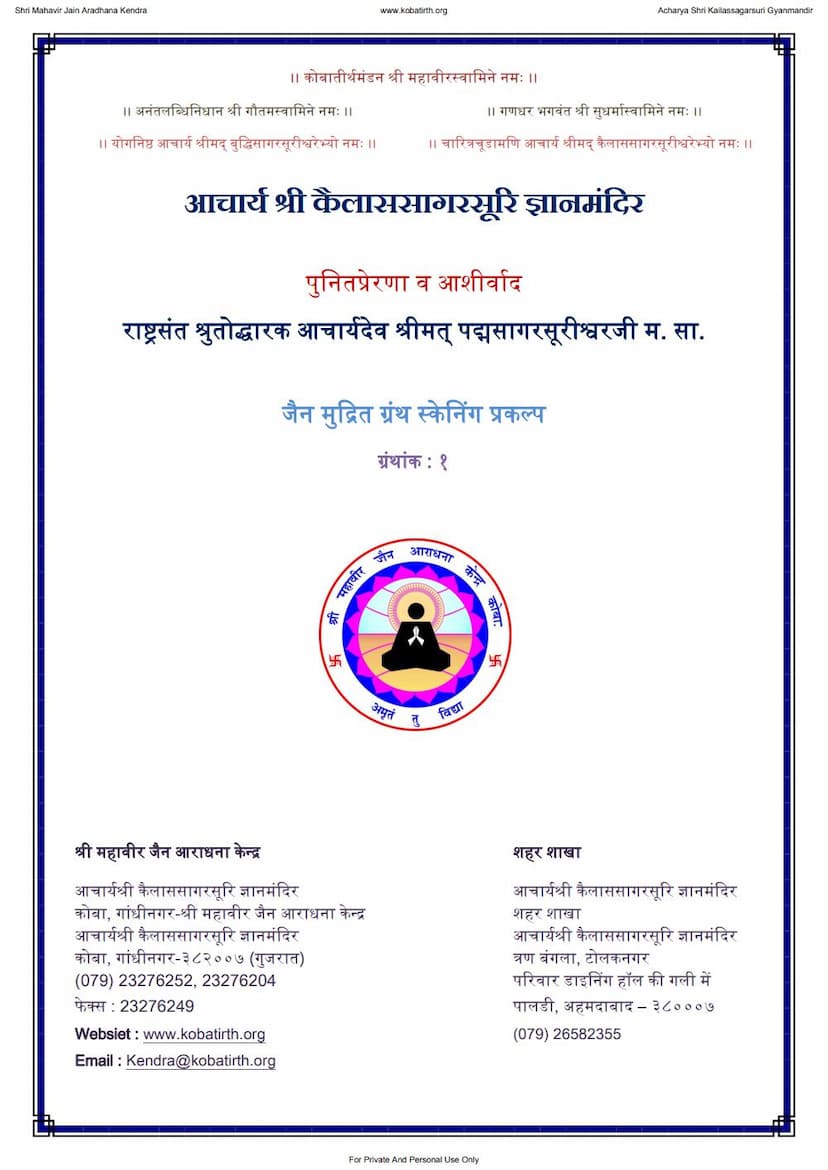Sarth Mahabharat Subhashitani
Added to library: September 2, 2025

Summary
This document is a collection of Marathi translations of verses (subhashitas) from various ancient Indian scriptures: the Mahabharata, Ramayana, Yogavasishtha, and Bhagavata Purana. The compilation is titled "Sarth" (meaning with meaning/explanation).
Here's a breakdown of the content:
Overall Purpose: The primary purpose of this compilation, as indicated in the prefaces and introductions, is to make the wisdom contained in these great epics and philosophical texts accessible to a wider Marathi-speaking audience. The translations aim to provide clarity and understanding of the profound ethical, philosophical, and spiritual teachings embedded in these works.
Key Texts and Their Content:
-
Sarth Mahabharat Subhashitani:
- Authors: Vishnu Vinayak Paranjape, Chintaman M Paranjape
- Publisher: Keshav Bhikhaji Dhavle
- Content: This section contains 1032 selected Marathi translations of verses from the Mahabharata. The verses are organized alphabetically and include references to their location within the Mahabharata (Parva, Adhyaya, Shloka). The introduction highlights the Mahabharata's purpose in dispelling ignorance, guiding people towards righteous conduct, preserving Aryan culture, and its accessibility due to its relatively simple language. It emphasizes the utility of these verses for students, speakers, writers, and general readers to enhance Sanskrit knowledge, understand life's principles, and behave appropriately in various situations.
-
Sarth Srimad Ramayana Subhashitani:
- Translator: Balchandra Shankshastri Devasthali
- Content: This part offers 502 selected Marathi translations of verses from the Ramayana. The organization follows a similar pattern to the Mahabharata section, with verses presented alphabetically and references to their location (Kanda, Sarga, Shloka). The introduction acknowledges the Ramayana as the "Adikavya" and a national scripture of the Aryans, emphasizing the selection of widely accepted verses.
-
Sarth Srimad Yogavasishtha Subhashitani:
- Translator: Vishnu Vinayak Paranjape
- Content: This section features 508 selected Marathi translations of verses from the Yogavasishtha. The introduction identifies Yogavasishtha as a renowned text on Vedanta, containing the teachings of Sage Vasistha to Rama. It outlines the six main sections and the number of verses, reiterating the organizational structure of verses and their locations. The preface to this volume (and others) also mentions that the second edition has been published due to the popularity of the first, and notes the increase in "Avataran" (citations indicating the speaker/context of the verse) for better understanding.
-
Sarth Srimad Bhagavatam Subhashitani:
- Translator: Vishnu Vinayak Paranjape
- Content: This part contains 117 selected Marathi translations of verses from the Bhagavata Purana. The organizational principles remain consistent with the other volumes.
-
Sarth Srimad Ramaraksha:
- Content: This is a brief mention of another published work, likely a devotional hymn.
Common Elements Across the Volumes:
- Publisher: Keshav Bhikhaji Dhavle, Girgaon, Mumbai, is consistently listed as the publisher.
- Editions: The "Nivedan" (Preface/Publisher's Note) indicates that these works are in their second edition, signifying their popularity and demand.
- Organizational Structure: The verses are generally organized alphabetically. Each verse is presented in Sanskrit (Devanagari script), followed by its Marathi translation ("Sarth"). Location references (like Parva, Sarga, Shloka numbers) are provided.
- Purpose of Compilation: The prefaces consistently state the goal of making these divine and national texts accessible for religious education and general upliftment.
- Jain Context: While the publisher is listed as "Shri Mahavir Jain Aradhana Kendra," and mentions of Jain scholars and centers appear (like "Acharya Shri Kailassagarsuri Gyanmandir," "Kobatirth"), the core texts translated (Mahabharata, Ramayana, Yogavasishtha, Bhagavata) are primarily from the Hindu tradition. This suggests that the Jain institution likely undertook the project of scanning, preserving, and publishing these valuable Indian literary and philosophical works, possibly seeing value in their ethical and philosophical teachings applicable across traditions, or as part of a broader cultural preservation effort. The phrase "JAIN EDUCATION INTERNATIONAL FOR PRIVATE AND PERSONAL USE ONLY" underscores the specific context of the source of this digitized material.
Summary of the Core Teachings (Inferred from the Subhashitas):
The collected verses touch upon a wide array of life's principles, including:
- Ethics and Morality: Righteous conduct, truthfulness, non-violence (Ahimsa), forgiveness, integrity, the importance of good character (Sheel).
- Action and Karma: The consequences of one's actions (Karma), the importance of duty, the need for effort (Purushartha), and the futility of idleness.
- Wisdom and Knowledge: The value of knowledge, the difference between wisdom and mere learning, the importance of discernment and critical thinking.
- Mind and Self-Control: The need for controlling desires, anger, ego, and the senses (Indriya Nigraha). The significance of self-awareness and mental discipline.
- Life and Death: The transient nature of life, the inevitability of death, and the importance of living purposefully.
- Society and Governance: The duties of a king, the welfare of the subjects, the importance of justice, and the consequences of misrule.
- Spiritual and Philosophical Concepts: References to Dharma, Artha, Kama, Moksha (the four Purusharthas), the nature of reality, the self (Atma), detachment, and the ultimate goal of spiritual liberation.
- Practical Life Advice: Wisdom for navigating worldly affairs, dealing with relationships (friends, enemies, family), managing wealth, and making sound decisions.
In essence, this compilation is a rich repository of ethical maxims and philosophical insights drawn from foundational Indian literature, presented in an accessible Marathi translation, likely preserved and disseminated through the efforts of the Jain Aradhana Kendra.